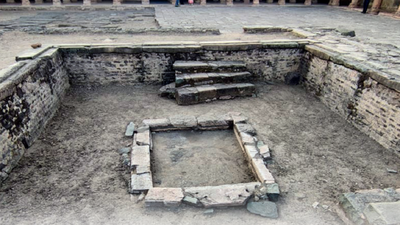- News
- City News
- bhopal News
- 39 broken idols found in 98-day ASI survey of Bhojshala complex in Madhya Pradesh
Trending
39 broken idols found in 98-day ASI survey of Bhojshala complex in Madhya Pradesh
The ASI survey at Bhojshala/Kamal Maula Mosque complex unearthed relics, sparking a dispute between Hindus and Muslims. The findings, including broken idols and inscriptions, are under scrutiny. Both communities continue to adhere to their religious practices during the survey, reflecting the ongoing tensions over the site's history.

The idols include those of Vagdevi (Saraswati), Mahishasur Mardini, Ganesh, Krishna, Mahadev, Brahma and Hanuman, say sources.The Muslim side doubts these findings, wondering "where they came from".
The multi-disciplinary scientific survey concluded on Thursday, and ASI is expected to submit its report on the findings before the court on July 4. Highly placed sources said ASI might seek a second extension to 'dig deeper into the structure and surrounding areas'.
Hindus believe Bhojshala was a temple to Goddess Vagdevi (Saraswati), while Muslims say it has always been a mosque. The Hindu Front for Justice moved Indore bench of high court, seeking an ASI survey, which was granted. Representatives from both Hindu and Muslim sides were allowed to accompany ASI experts during the survey every day.
On June 27, the last day of the survey, ASI found at least seven structures during excavation in the northern side of Bhojshala, said Gopal Sharma, representative of the Hindu Front for Justice (HFJ). "One of them was the broken idol of a goddess, and the rest are broken pieces of a pillar. Only the neck and face of the idol were found," he added.
ASI roped in Geological Survey of India (GSI) and deployed ground-penetrating radars to examine the area in and around the
Bhojshala complex.
HFJ's Ashish Goyal told TOI, "ASI has declared end of excavation, stating that all the work related to it has been completed and they don't find need for any further excavation." All the relics found so far have been cleaned, numbered and many have been sent for carbon dating.
Excavation was carried out at about two dozen places in the Bhojshala premises and its periphery, up to 50 metres on all sides, Goyal said.
Linguistics experts have prepared reports on the various inscriptions in different languages found on pillars and walls of the complex. These have been translated to English. Sketches prepared by artists especially hired for this survey will be part of the report.
The most important aspect will be the carbon-dating report of the objects found during excavation, as it will help fix age and timeline, said a source.
The Muslim side says court norms were not adhered to during the inspection. Dhar Shahar Qazi Wakar Sadiq said, "Our main objection is that the survey was not conducted as per the guidelines of Supreme Court. SC had asked not to carry out physical excavation that could affect the monument in any manner. The room where idols have allegedly been found in large numbers was with Muslim community till 1997 and was handed over to ASI when they asked us for it. There were no idols at that time and I'm very surprised that such a large number of idols have been found dumped in the same room. Though ASI has not said anything on the findings, some people are spreading in media and social media that idols of Hindu Gods have been found in the excavation. In this matter, our stand is that they are not idols and are merely haphazard inscriptions on stone."
On March 11, a division bench of Justice S A Dharmadhikari and Justice Devnarayan Mishra, had directed ASI to form a five-member expert committee and submit a survey report within six weeks. The survey started on March 21. On April 29, ASI sought an extension and HC granted eight more weeks, making it clear that no more extensions would be allowed.
During the survey, Hindus continued to pray on Tuesdays and Muslims offered namaz on Fridays as per a 2003 ASI order.
End of Article
FOLLOW US ON SOCIAL MEDIA










